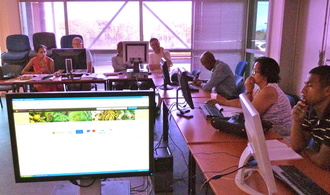First Agrofert’îles meeting a success
Written by Modified on the
Agrofert'îles, an agriculturally-themed event held for the first time in Réunion from November 18th to 22nd 2013, was a resounding success among farmers, researchers and industry professionals. The e-PRPV network was the co-organizer of the event.
Sharing knowledge and collaboration
The event endeavoured to bring together members of research and training institutions and local businesses. Partners included all the major R&D organizations as well as Reunion’s agricultural training and support networks : Cirad, Armeflhor, St. Paul Agricultural College, IUT St -Pierre, the RITA networks, the QualiREG and e-PRPV networks and the Technopole. This unique event reflected the shared commitment of all partners to improve coordination of joint actions, build a positive image for the island's agriculture, but also to offer solutions to industry professionals in response to rapidly changing technologies, national and European regulations, the international competitive environment and consumer demand.
Agrofert'îles and Regional cooperation
The Agrofert'îles event offered a unique opportunity for the various members of the agricultural production industry in Reunion to make contacts and collaborate with their opposite numbers from other counties. The event, as its name suggests, also served to remind those present of the need for strong regional cooperation in the south-east Indian Ocean. Delegations from Madagascar, Mauritius, the Comoros and the Seychelles were invited to the event and attended and actively participated in conferences, debates and workshops throughout the week at the different sites (Cirad,Armeflhor, IUT Saint-Pierre and the St. Paul Agricultural College).
e -PRPV : a tool for the entire Indian Ocean area
The e-PRPV database demonstrates how effective regional cooperation in the Indian Ocean can be. An e-PRPV workshop was organized during the Agrofert'îles event. e-PRPV centralizes access to information and data relating to pests in the Indian Ocean area. For the time being, data covers the islands of Comoros, Madagascar, Mauritius, Reunion and the Seychelles. Because of the geographical proximity and similarity of their ecosystems, these five countries share many pests and diseases, especially those affecting commercial crops such as vegetable and fruit crops. The objective of thisworkshop was threefold : to work on the taxonomy of organisms (latest developments and regulations), the scientific validation of data and observations collected in each country, and finally to facilitate the implementation of an effective communication system between the various countries of the south-west Indian Ocean.
An event dedicated to agricultural science and biodiversity in the Indian Ocean
On November 21, the e-PRPV network organized an event at the IUT of St-Pierre dedicated to the scientific presentation of research carried out in e-PRPV/IRACC projects, and ended with a debate on the use of auxiliary organisms in agroecology.
The program : (see all the presentations here)
- e-PRPV database : status and prospects
- Diagnostic methods for epidemiological surveillance of pathogens in the Indian Ocean
- Genetic diversity of Ralstonia solanacearum strains pathogenic to potato in the Vakinankaratra region
- The fight against fruit flies in the Seychelles
- Genetic and pathological diversity of Xanthomonasstrains responsible for bacterial tomato spots and peppers in the southwest Indian Ocean
- Biological control of pests in the Indian Ocean : status and prospects
- Biological control program against coconut whitefly in the Comoros : Aleurotrachelus atratus Hempel
- Use of chemical crop protection in the Indian Ocean countries and alternative regional methods
- The Apis mellifera bee in the Indian Ocean region : subspecies, bee health and ecology
- Production of corn in the Indian Ocean for family-based agriculture and the regional market
- Sustainable agriculture in the Indian Ocean : methodology
- Biophyto : sustainable mango production without insecticides in Reunion



